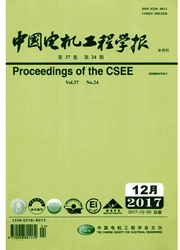

 中文摘要:
中文摘要:
谐波频谱分析是深入了解电能质量特性的关键手段。目前,参数化分析方法因具有超分辨率能力而逐渐被广泛应用,但其对噪声非常敏感,尤其在非高斯噪声或冲击噪声环境中分析精度急剧降低甚至失效。为减少大偏差数据对参数估计精度及有效性的影响,提出将稳健统计方法应用于谐波参数估计,推导基于M-估计器的谐波参数的迭代优化计算公式。此外,为进一步提高算法性能,还采用稳健性好的旋转不变技术参数估计(estimation of signal parameters via rotational invariance techniques,ESPRIT)算法获取谐波频率的迭代初值,避免了迭代优化陷入局部最优且加快了收敛速度。仿真实验结果表明:该方法极大改善了原有参数化分析方法在非高斯噪声和冲击噪声条件下运用的局限性,对谐波及间谐波参数的估计都具有很好的稳健性及精确性,适合实际应用。
 英文摘要:
英文摘要:
The harmonic analysis plays an important role in understanding the electrical parametric harmonic analysis power quality. At present, methods are being gradually utilized widespreadly in the power system for their high resolution ability. However, they are susceptible to noise in signals. Especially, the analysis precision will be greatly eroded and even ineffective in the non-Gaussian noise environment. To reduce the influence brought by bad data, a robust parametric harmonic analysis method is proposed, which is based on M-estimators and can be used to estimate unknown parameters of all harmonics and inter-harmonics in signals in an iterative way. Furthermore, the estimation of signal parameters via rotational invariance techniques (ESPRIT) is also employed to acquire the initial iteration value of harmonic frequency, as can keep the objective function of M-estimator away from local minima and improve convergence rate of the optimization procedure. The simulation results show that the proposed method is robust and accurate for estimating parameters of harmonics and inter-harmonics in the non-Gaussian noise environment. The method is suitable for practical applications, because of its fast converging rate.
 同期刊论文项目
同期刊论文项目
 同项目期刊论文
同项目期刊论文
 Small-signal modelling and analysis of wind turbine with direct drive permanent magnet synchronous g
Small-signal modelling and analysis of wind turbine with direct drive permanent magnet synchronous g Pulse width modulation AC/DC converters with line current harmonics minimisation and high power fact
Pulse width modulation AC/DC converters with line current harmonics minimisation and high power fact Zero-Voltage-Switching PWM Full-Bridge Converter Employing Auxiliary Transformer to Reset the Clampi
Zero-Voltage-Switching PWM Full-Bridge Converter Employing Auxiliary Transformer to Reset the Clampi Symmetrical short circuit current characteristics of doubly fed induction generator wind turbine wit
Symmetrical short circuit current characteristics of doubly fed induction generator wind turbine wit Full Feedforward of Grid Voltage for Discrete State Feedback Controlled Grid-Connected Inverter With
Full Feedforward of Grid Voltage for Discrete State Feedback Controlled Grid-Connected Inverter With Multiple-Complex Coefficient-Filter-Based Phase-Locked Loop and Synchronization Technique for Three-
Multiple-Complex Coefficient-Filter-Based Phase-Locked Loop and Synchronization Technique for Three- Improved current regulation of three-phase grid-connected voltage-source inverters for distributed g
Improved current regulation of three-phase grid-connected voltage-source inverters for distributed g Flexible Control of Three-Phase Distributed Generation Systems for Voltage Rise Mitigation in Microg
Flexible Control of Three-Phase Distributed Generation Systems for Voltage Rise Mitigation in Microg Voltage stability of medium and low voltage distribution networks with wind generation based on Hilb
Voltage stability of medium and low voltage distribution networks with wind generation based on Hilb SABER-Based Simulation for Compact Dynamic Electro-Thermal Modeling Analysis of Power Electronic Mod
SABER-Based Simulation for Compact Dynamic Electro-Thermal Modeling Analysis of Power Electronic Mod 期刊信息
期刊信息
